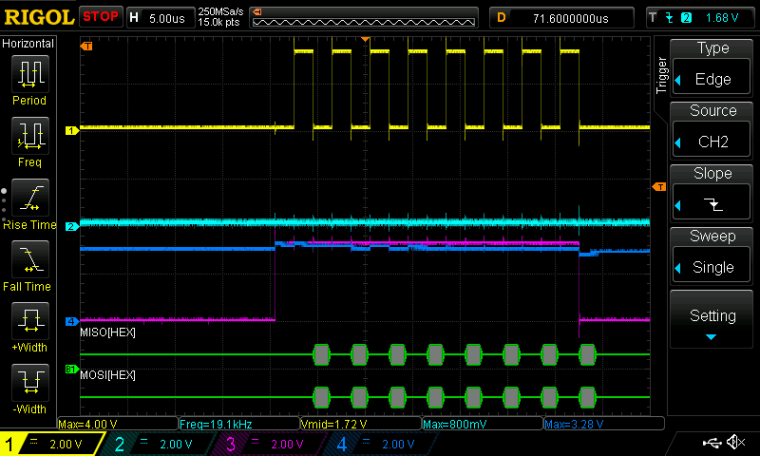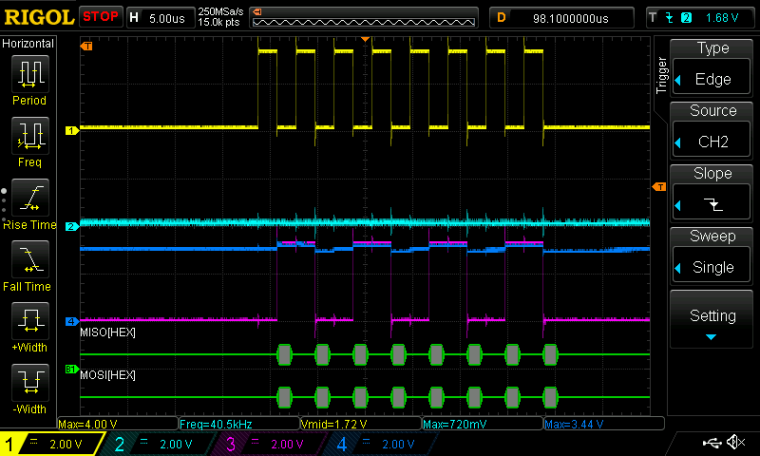SPI bug?
-
I'm seeing some very strange behavior on the SPI inteface on a LoPy.
The SPI class is instantiated as so:
from machine import SPI
spi = SPI(0, mode=SPI.MASTER, baudrate=250000, polarity=0, phase=0, bits=8, firstbit=SPI.MSB)Using a very simple test loop:
while True:
cs(0)
spi.write(b'\xFF')
cs(1)This works as expected:

In the screenshot:
- Yellow - SPI Clock
- Light Blue - CS line (P9 in this example, although here it's only used to trigger the o'scope)
- Dark Blue - MISO
- Pink - MOSI
Note that there is nothing connected to the SPI pins (using defaults P10/11/12), except a pull-up on MISO. Also, I've tested other values in the write function, including a bytes array, and what I see on the o'scope matches what I'm writing exactly, as expected.
But when I use this test loop:
while True:
cs(0)
spi.read(1, write=0xFF)
cs(1)I see this:

Note that the LoPy is driving MOSI (with what appears to be 0x55). What's even more interesting is that this is the pattern I see regardless of the value supplied to the 'write' argument).
I couldn't find the source code for the SPI class (not sure if it's published), so I wasn't able to look at the read code. Could this be a bug or am I doing something wrong?
-
Is there a fix to this? Im running the latest 1.18.2.r2 and im having this exact issue only the write_readinto() work around doesnt seem to work.
-
@paul-thornton It should be mentioned that this was based on @throwaway's analysis of the place of failure. So kudos to him.
-
Just to follow up on this.
@robert-hh has done some wonderfull work. His fix has been merged into the next RC candidate. Thanks again @robert-hh, @paulM and anyone else who's been involved.
Edit: Additional thanks to @throwaway for his work in debugging this,
-
@throwaway Actually, to commits to make it complete. The commit text mentions the analysis done by you, folks.
Accidentally, since it should have been a separate PR, but git merged it all together.
-
@PaulM Neat!
I noticed that @robert-hh's patch accidently snuck into this PR: https://github.com/pycom/pycom-micropython-sigfox/pull/241/files
-
This was the simple way I worked around it, until fixed in native API:
def spiread(spiObj, nbytes, write=0x00): wb = bytearray() wb.extend(bytearray([write]*nbytes)) rb = bytearray(len(wb)) spiObj.write_readinto(wb,rb) return rb
-
Good diagnosis. Ill talk to the team and make sure they are aware of this and it get's looked into.
-
@throwaway Thanks for pointing at the interesting places. It looks like not all cases of spi_transfer had been considered. Maybe it should be:
if (txdata) { memcpy(&_txdata, &txdata[i], self->wlen); } else { if (txchar) { _txdata = *txchar; } else { _txdata = 0x55555555; // Just some dummy value } }Edit: Tested the change; it seems to work.
Edit2: There is still a glitch: when setting bits=32, bit 31 of the word at write=xxxx must be 0, so the largest value is 0x7fffffff.
Edit3: OK. Using negative numbers you can set bit31. Conversion of a hex pattern could be done with struct.unpack, like:
spi.read(4, write=struct.unpack("<i", b'\x80\x80\x80\x80')[0])
-
Came across someone's post from Nov, 2018 and it looks like you're right.
See https://github.com/pycom/pycom-micropython-sigfox/blob/master/esp32/mods/machspi.c#L402 and https://github.com/pycom/pycom-micropython-sigfox/blob/master/esp32/mods/machspi.c#L190. The former actually considers the
writeargument but it's completely ignored inpybspi_transfer(). Instead the code uses 0x55555555 because there's aNULLTX buffer in the call thatpyb_spi_read()makes.STATIC mp_obj_t pyb_spi_read(mp_uint_t n_args, const mp_obj_t *pos_args, mp_map_t *kw_args) { static const mp_arg_t allowed_args[] = { { MP_QSTR_nbytes, MP_ARG_REQUIRED | MP_ARG_OBJ, }, { MP_QSTR_write, MP_ARG_KW_ONLY | MP_ARG_INT, {.u_int = 0x00} }, }; // parse args mach_spi_obj_t *self = pos_args[0]; mp_arg_val_t args[MP_ARRAY_SIZE(allowed_args)]; mp_arg_parse_all(n_args - 1, pos_args + 1, kw_args, MP_ARRAY_SIZE(args), allowed_args, args); // get the buffer to receive into vstr_t vstr; pyb_buf_get_for_recv(args[0].u_obj, &vstr); // just receive uint32_t write = args[1].u_int; pybspi_transfer(self, NULL, vstr.buf, vstr.len, &write); // return the received data return mp_obj_new_str_from_vstr(&mp_type_bytes, &vstr); }and:
STATIC void pybspi_transfer (mach_spi_obj_t *self, const char *txdata, char *rxdata, uint32_t len, uint32_t *txchar) { if (!self->baudrate) { nlr_raise(mp_obj_new_exception_msg(&mp_type_OSError, mpexception_os_request_not_possible)); } // send and receive the data for (int i = 0; i < len; i += self->wlen) { uint32_t _rxdata = 0; uint32_t _txdata; if (txdata) { memcpy(&_txdata, &txdata[i], self->wlen); } else { _txdata = 0x55555555; } spi_data_t spidata = {.cmd = 0, .cmdLen = 0, .addr = NULL, .addrLen = 0, .txData = &_txdata, .txDataLen = self->wlen, .rxData = &_rxdata, .rxDataLen = self->wlen}; spi_master_send_recv_data(self->spi_num, &spidata); if (rxdata) { memcpy(&rxdata[i], &_rxdata, self->wlen); } } }The upcoming v1.20 RC might have a different implementation that writes out whatever appears in the input buffer before updating it with whatever comes in -- although I'm not sure when "soft" SPI is used. See here:
https://github.com/pycom/pycom-micropython-sigfox/blob/release-candidate/drivers/bus/softspi.cThis might also be relevant:
https://github.com/pycom/pycom-micropython-sigfox/blob/release-candidate/extmod/machine_spi.c
-
Additional info...
I'm pretty well convinced that none of the SPI functions that take a 'write' argument pay any attention to that argument--no matter what, only 0x55 is sent during the operation. So I tried rewriting my SPI driver to use only the write_readinto function, passing in a write buffer full of 0xFF. This worked as expected (and made my driver work as well--unfortunately, it makes for some pretty gross code to use only write_readinto).